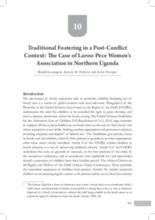This chapter from Social Work Practice in Africa: Indigenous and Innovative Approaches presents a traditional fostering model adopted by a group of women in Northern Uganda, analysing its potential for building resilience and for contributing to social capital and social development within the broad context of post-conflict situations. The paper draws from data obtained from a broader study conducted in Uganda under the PROSOWO project (Professional Social Work in East Africa). The study examined the indigenous and innovative models of social work practice in Uganda. While the study was broadly conducted in three regions of Uganda, namely North (Gulu District), Central (Rakai District) and Western Region (Rukungiri and Mbarara Districts), this chapter focuses on one indigenous social work model, namely the traditional fostering of children by LAPEWA identified in Gulu District. The term LAPEWA refers to a women’s association in the two communities, Laroo and Pece.

